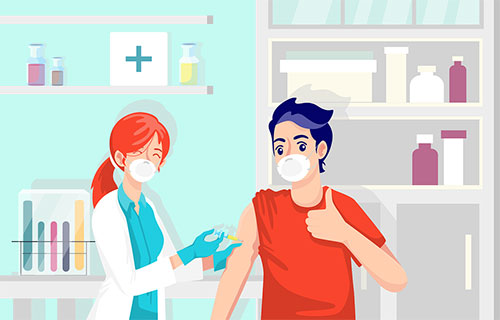Dermatological Conditions and Covid Vaccination
Dermatologists have been receiving many enquiries over the last few months after the launch of the Covid vaccine regarding the safety of the vaccines in patients undergoing treatment for dermatological conditions. This article aims to provide a practical insight into this issue and to allay unwanted fears and misconceptions.
In patients with skin disorders that are related to allergies, like eczema (atopic, contact, etc.) and urticaria, there is no evidence of increased risk of adverse reactions with Covid vaccination compared with the normal population. If their eczema is adequately controlled with medications, they can get vaccinated without any problem. The same would hold good for patients with psoriasis who are in good remission with medications. In most of these patients on topical therapies with antihistamines/ emollient support, vaccination can be done without any hesitation.

Patients on immunosuppressives (steroids, azathioprine,mycophenolate, cyclosporine, methotrexate, biologics, tocilizumab) for control of eczema/ psoriasis should consult their dermatologist before taking the vaccine as there may be a need to adjust the dosage of these medications / stop medications for a short time to enable vaccination. This is to ensure that as much as possible the efficacy of vaccination is not compromised. There are good international guidelines for the same, and the treating dermatologist should be able to advice accordingly.
Patients experiencing flares of conditions like eczema, psoriasis, pemphigus etc., are usually advised to wait until the flares subside as they are usually on a moderate to high dose of immunosuppressives at that time to control the flare. They can take the vaccination when the flares subside and their immunosuppressive doses are at an acceptable level for vaccination.
In chronic urticaria patients, well-controlled with antihistamines, there is no contraindication for vaccination. Patients on immunosuppressives for urticaria should consult their dermatologist for dose adjustments prior to vaccination. Worsening of chronic urticaria post-vaccination is rare and is also manageable in most occasions with adjustments in the dose of medications.
There is no contraindication for vaccination in patients with food allergy / insect bite allergy / antibiotic allergy / contact allergy (e.g., Nickel)
Specialised skin/ blood tests prior to vaccination is not required for these patients.
There is no preference for any particular vaccine in dermatology patients in most clinical settings.
Patients suffering from mastocytosis or those who have had a severe drug reaction or a severe allergic reaction previously to another non-covid vaccine should inform the vaccination centre physicians accordingly so that additional safety measures can be ensured during vaccination. Vaccination can be done in most of these persons without any issue.
The only absolute contraindication for vaccination is an allergy to the vaccine components / adjuvants. If there is a severe allergic reaction after the first dose, the patients should approach their physicians for appropriate advice before the second dose.
In conclusion, a vast majority of patients on treatment for dermatological conditions can take Covid vaccines without any problem. In certain special situations, the treating dermatologist would incorporate certain changes in the treatment strategy to enable successful vaccination. The benefits of Covid vaccination in dermatology patients outweigh the minimal risks by a huge margin; hence patients with dermatological conditions should not hesitate to take Covid vaccines.

Dr. Vijay Kartik V.
Consultant Dermatologist
Kauvery Hospital, Chennai

